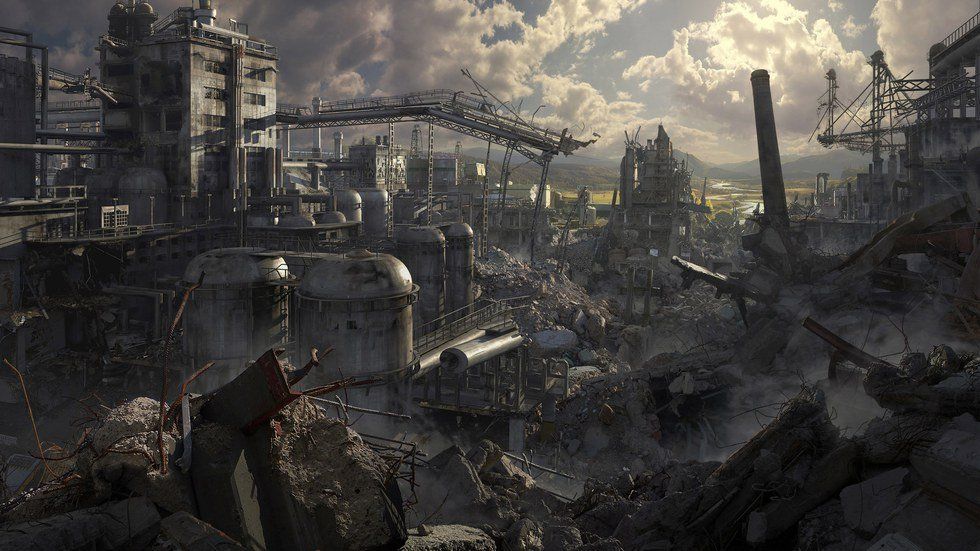Author Neil Gaimon once said that "any story is about a host of things. It is about the author; it is about the world the author sees and deals with and lives in; it is about the words chosen and the way those words are deployed; it is about the story itself and what happens in the story; it is about the people in the story; it is pandemic; it is opinion." There are countless things that fiction does. We often look to fiction as a means to escape the reality of our everyday lives, to experience things we may not get to otherwise. They promote creativity and imagination. Fiction helps us gain empathy, as we put ourselves in the character's shoes and see things from various points of view.
Fiction can also serve as a warning.
Dystopian books give us glimpses into potential futures. Some of them seem completely unlikely; with little to no possibility of ever occurring. Other books carve out ideas of the future that don't seem very far fetched at all. 1984 by George Orwell and Fahrenheit 451 by Ray Bradbury are two such books which fall into the latter category.
In 1984, the world is in a constant state of war and the people of Oceania, who mostly live in poverty, have no inkling of what privacy is. Their words, actions, and even thoughts are heavily monitored, and anyone who harbors intentions contrary to what Big Brother enforces will earn you a swift bullet to the head. In Fahrenheit 451, all manner of personal intimacy is frowned upon. People entertain themselves by viewing reality show style sitcoms via wall sizes screens and plugs they keep in their ears to transmit sounds. Going on walks is discouraged, sitting and talking with other people is discouraged, and did I mention that owning books is completely illegal? In this world firemen don't put out fires, they start fires.
Each of these books present a world that is lacking in interpersonal relationships. One is a world defined by want, the other by excess.
Both are horrific.
Like many of you, I read both of these books in high school. I hadn't given them much thought until recently. After the election I figured it might be prudent to pick them up again. And in doing so I realized that perhaps the most terrifying aspect of these two novels is the fact that we are already seeing some resemblances of both of these worlds in our current society. Some of the technological advances that we see in the world of Fahrenheit 451 (the reality television, huge screens, Bluetooth) are things that are already in existence. The media tells us who to like, who to hate, and why. And sometimes we don't even question it, or even THINK to question it.
"Until they become conscious they will never rebel, and until after they have rebelled they cannot become conscious..." (George Orwell-1984)
So what can we do to counter this? How can we prevent such futures from taking place?
In the afterword of 1984, Erich Fromm said that "the mood {of the the book} it expresses is that of near despair about the future of man, and the warning is that unless the course of history changes, men all over the world will lose their most human qualities, will become soulless automatons, and will not even be aware of it." The two main ways the general population of society loses power in both of these stories are through misinformation and the loss of free will. These are key elements that may give us an idea on how to prevent similar situations from happening to us.
One of the main things, in my opinion, that we need to do is question things, especially if they don't sound right. We need to stop swallowing everything the media and the government tells us and start asking informative questions about the information we are being fed. The second thing is to be true to yourself, as a person. If you believe in something and feel strongly about it, don't give it up! Even if the majority of people tell you that you're wrong, stay true to your beliefs and to yourself.
The future can sometimes feel like a vast gulf, and any light we shine at it can seem insignificant when you think of all the different factors that can attribute to where we are going and how we get there. But what we should remember is that even the smallest action can make a big difference, for good or for bad. As long as we are true to ourselves and to each other, and move toward the future positively, I have no doubt that we'll be okay. Because for me, what stuck with me the most after rereading both books, is that a single person can stand up against an oppressive force if they are strong in their convictions.
"Everyone must leave something behind when he dies. A child or a book or a painting or a house or a wall built or a pair of shoes made. Or a garden planted. Something your hand touched some way so your soul has somewhere to go when you die, and when people look at that tree or that flower you planted, you're there. It doesn't matter what you do, so long as you change something from the way it was before you touched it into something that's like you after you take your hands away." -Ray Bradbury, Fahrenheit 451




















